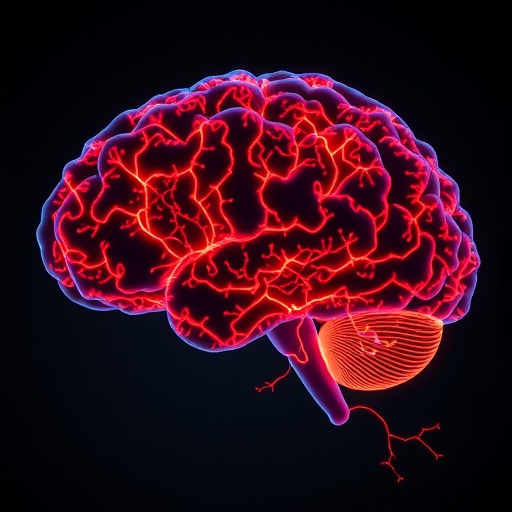In an era where neuroscience relentlessly uncovers the subtle molecular underpinnings of mental health disorders, a groundbreaking study published in Translational Psychiatry sheds new light on the role of adiponectin receptor 1 (AdipoR1) in the hippocampus and its impact on depression-like behavior. This research elegantly bridges metabolic signals with synaptic integrity, revealing profound implications for how mood disorders might be understood and ultimately treated.
The hippocampus, a pivotal brain structure integral to memory formation and emotional regulation, has long been implicated in the pathophysiology of depression. Yet, the molecular players orchestrating these complex neuronal functions have remained partially elusive. The study conducted by Zhu et al. identifies AdipoR1—a receptor better known for its metabolic regulatory functions—as a critical modulator of synaptic structure and function within the hippocampus, linking metabolic dysfunction directly to psychiatric symptoms.
Adiponectin, a hormone secreted by adipose tissue, has primarily been studied in the context of insulin sensitivity and energy homeostasis. Its receptors, particularly AdipoR1, mediate intracellular signaling cascades influencing glucose metabolism and inflammation. Intriguingly, the expression of AdipoR1 in the hippocampus suggests a neurobiological role beyond peripheral metabolism, recent findings indicate potential influences on synaptic plasticity and neuronal resilience—core components disrupted in depression.
The paper meticulously details experiments demonstrating that downregulating AdipoR1 expression in the hippocampus leads to marked impairments in synaptic function and dendritic spine density. These structural changes correspond with depressive-like behaviors in animal models, providing compelling evidence that AdipoR1 is indispensable for maintaining proper synaptic architecture and neurotransmission. This convergence of metabolic and neuropsychiatric pathways opens novel avenues for therapeutic intervention.
Advanced electrophysiological techniques employed by the researchers revealed diminished long-term potentiation (LTP) in hippocampal neurons deficient in AdipoR1. Since LTP is widely accepted as a correlate of learning and memory, its reduction underscores functional deficits in synaptic efficacy, which likely contribute to the cognitive and emotional symptoms observed in depression. These findings emphasize the receptor’s importance in both synaptic plasticity and behavioral outcomes.
On a molecular level, the study provides insights into the downstream signaling disrupted by AdipoR1 depletion. Key pathways involved in neuroplasticity regulation, including AMP-activated protein kinase (AMPK) signaling and peroxisome proliferator-activated receptor alpha (PPARα) activation, are attenuated. This mechanistic understanding delineates how metabolic signals translate into neuronal structural changes, thus influencing mood regulation and synaptic health.
Furthermore, the research highlights alterations in excitatory-inhibitory balance following AdipoR1 knockdown, a neurophysiological alteration often observed in depressive states. The shift in glutamatergic and GABAergic signaling exerts profound effects on hippocampal network dynamics, potentially leading to the maladaptive stress responses and emotional dysregulation characteristic of depression.
Behavioral assays conducted reinforce the biochemical and physiological data. Animals with targeted AdipoR1 suppression exhibit increased immobility in forced swim tests and reduced sucrose preference, classical proxies for despair and anhedonia in rodents. These phenotypes strongly mirror core depressive symptoms in humans, providing a translational bridge that validates the receptor’s role in mood disorders.
Importantly, the study’s findings invite a broader conceptual framework where metabolic dysregulation and neuronal plasticity intersect. Obesity and diabetes have long been epidemiologically linked to higher rates of depression, yet the molecular granularity of this relationship remained unclear until now. AdipoR1’s dual involvement in metabolism and synaptic function elucidates a molecular nexus that might explain this complex comorbidity.
This convergence also sparks the exciting possibility of repurposing metabolic drugs for psychiatric use. Agents targeting adiponectin pathways or enhancing AdipoR1 signaling could, in theory, restore hippocampal synaptic health and alleviate depressive symptoms. Such pharmacological interventions would represent a paradigm shift, emphasizing metabolic modulation as a viable antidepressant strategy.
The study’s methodology exemplifies the cutting edge of neuroscience research, integrating molecular biology, electrophysiology, structural imaging, and behavior across a multi-disciplinary spectrum. The use of viral-mediated gene knockdown specifically in hippocampal neurons enables precise dissection of AdipoR1’s localized effects, circumventing systemic confounds that frequently obscure brain studies.
Longitudinal analyses reveal that AdipoR1 downregulation impairs not only the acute synaptic response but also longer-term synaptic remodeling, hinting at a progressive deterioration process that could mirror chronic depression’s neurodegenerative aspects. This temporal dimension emphasizes the receptor’s importance across both immediate and sustained neuronal health.
Strikingly, the authors observe that restoring AdipoR1 function alleviates synaptic deficits and rescues depressive-like behaviors, underscoring the receptor’s therapeutic potential. This reversible phenotype highlights AdipoR1 as a promising target for novel antidepressants that may differ fundamentally from current monoaminergic drugs, which often suffer from delayed onset and partial efficacy.
The findings also have implications beyond depression, potentially impacting other neuropsychiatric conditions associated with hippocampal dysfunction such as anxiety disorders, cognitive impairment in metabolic syndromes, and perhaps even neurodegenerative diseases. By identifying AdipoR1 as a molecular linchpin, the study expands understanding of how metabolic state influences brain health more broadly.
As the field moves forward, future work will need to delineate how systemic adiponectin levels interact with central AdipoR1 signaling, whether peripheral metabolic alterations contribute causally, and how lifestyle interventions might modulate this axis. Additionally, the potential sex differences in AdipoR1 function and its role in depression warrant thorough investigation, considering known gender disparities in mood disorder prevalence.
In summary, Zhu and colleagues illuminate an elegant molecular pathway linking adiponectin receptor signaling in the hippocampus to synaptic structural integrity and behavioral manifestations of depression. Their work provides a robust mechanistic foundation for exploring metabolic therapies for neuropsychiatric disorders and redefines how scientists conceptualize the intricate dialogue between systemic physiology and brain function in mental health.
Subject of Research: Downregulation of Adiponectin Receptor 1 (AdipoR1) in the hippocampus and its effects on synaptic function, structure, and depression-like behavior.
Article Title: Downregulation of AdipoR1 in the hippocampus impairs synaptic function and structure and causes depression-like behavior.
Article References:
Zhu, P., Luo, Y., Li, Y. et al. Downregulation of AdipoR1 in the hippocampus impairs synaptic function and structure and causes depression-like behavior. Transl Psychiatry 15, 277 (2025). https://doi.org/10.1038/s41398-025-03495-0
Image Credits: AI Generated




